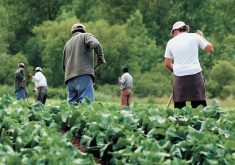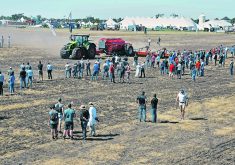COVID-19 has been a godsend for Skip the Dishes, Uber Eats and other food delivery companies.
It’s also been a blessing for critics of the global food system.
Dozens of academics and reps from environmental groups have used COVID-19 as an opportunity to slam “industrial farms” and “corporate control” of food distribution and take shots at international trade.
Many of them, some activists and not, are calling for nations and regions to be self-sufficient in food and build local supply chains so the system is more resilient to shocks.
Read Also

Ag in Motion innovation awards showcase top 2025 ag technology
The 2025 Ag in Motion Innovation Awards celebrated winners across five categories: agronomics, agtech, business solutions, environmental sustainability and equipment.
Such rhetoric sounds appealing but it doesn’t stand up to analysis, says Ryan Cardwell, a University of Manitoba agricultural economist.
For example, if Canadians decided to stop importing food and depended solely on domestic production, the food system would be weaker during a crisis, including a pandemic.
“We could conceivably close our border to food trade and only consume what we produce,” said Cardwell, who specializes in international trade and food policy at the U of M.
“(But) I have absolutely no problem saying the disruptions would be worse, if we had a closed, insular food system.”
In May, Jennifer Clapp, a University of Waterloo political economist, wrote a piece in the New York Times with the headline, Spoiled Milk, Rotten Vegetables and a Very Broken Food System.
The article argued that the global food system, in which countries specialize in what they’re good at, fails in the time of a crisis because the trade and movement of food can collapse.
“We need to rejuvenate local and regional food systems to reduce the vulnerabilities that come with being too reliant on imported and corporate-dominated foods,” Clapp wrote.
“This doesn’t mean cutting off all trade or abolishing all packaged foods, but it does mean building diversity … (and) shorter, more sustainable food supply chains that are closer to home.”
Bill Kerr, a University of Saskatchewan ag economist, worries this argument will take hold and could affect nations that export food, like Canada.
In response to COVID-19, countries could emphasize self-sufficiency and vow to reduce imports of food.
“The motivation for imposing trade barriers will be different than traditional protectionism,” Kerr wrote in a special issue of the Canadian Journal of Agricultural Economics, which was released in late April.
“Countries may feel that they are too dependent on foreign suppliers. They may want to retreat from globalization and encourage additional domestic supplies.”
That is a real risk.
Clapp and others may convince politicians that food imports are a problem and local food is the solution. If nations do “retreat from global markets,” it could hurt the income of Canadian canola growers and livestock producers who depend on exports, Cardwell said.
But he’s more worried about people living on low incomes.
“Not to downplay effects on exporters … but I find in all these discussions that consumers are almost completely ignored,” he said.
“It’s consumers who gain the most from trade.”
If a nation ceased all imports of food, the consequences would be higher prices, less variety and more problems with food security.
In other words, more problems, not less.
That’s because food production is risky. Plant diseases, droughts, floods and other factors can decimate crop yields. If all the production is in a relatively small region, the supply is at risk.
“The more diverse your source of food is, the safer you are,” Cardwell said.
“If you are in a closed food market and something happens, you’re in real trouble.
If the domestic supply was in jeopardy, restoring food imports is not a simple task. It can take years to build the supply chains, freight and contracts necessary to import meat, fruit and vegetables.
One of the lessons from COVID-19 is that Canada’s food system has been fairly resilient, Cardwell said.
There has been panic buying and some empty shelves, but most Canadians are able to get what they need.
“The current system, for all its warts … has held up remarkably well,” he said. “Prices are not going through the roof…. We have fresh berries…. That is a testament to diversification and (trade).”
Contact robert.arnason@producer.com


















